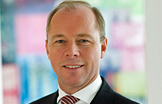Assuming there is no renewed escalation in the European sovereign debt crisis, the outlook for the German economy is very positive. "We expect to see growth of around 2 percent in the course of both 2012 and 2013. Given the low 'growth overhang' from 2011, this gives average GDP growth of only 1 percent this year, but accelerating to 2 percent in 2013. Growth at this pace is sufficient to continue to bolster the upswing on the labor market. At the end of 2013 only 2.5 million people would then be out of work in Germany," said Michael Heise, Chief Economist at Allianz.
Upswing in Germany regaining momentum
Download
Although the situation in Europe remains critical, substantial progress has been made in tackling the crisis. "The central players are all playing a role: Governments in the peripheral countries are knuckling down to austerity, European policymakers have taken an important step forward with the fiscal compact, and the European Central Bank has provided a sizeable rescue fund of its own – also due to the longer reaction time at the policy level, whereby the ECB measures are of a supportive, temporary nature," said Heise.
As far as further liquidity injections are concerned, increased caution would seem appropriate given that the risks that the medicine could have negative side effects are rising considerably. Conversely, it is unlikely that the ECB will swiftly pull the plug on its unconventional measures. The key interest rate will remain unchanged at 1 percent until the end of the year. On the one hand, although the economy will remain vulnerable and jitters persist on the financial markets for the time being, on the other the recent signs of improvement in the economy are likely to continue, the turbulence surrounding the debt crisis gradually fade and the price stability benchmark of 2 percent be missed again, as last year.
In 2011 the world economy lost substantial momentum. At the beginning of this year, key indicators are signaling that the slowdown in the global economy is not set to continue. Global industrial production, which had already rebounded in December 2011, rose again sharply in January, putting it almost 1.5 percent up on the overall disappointing level seen in the final quarter of 2011. Heise: "All in all, there is much to suggest that the world economy will remain on the growth path. Nonetheless, 2012 won't be an easy year. Above all, the consolidation of public-sector budgets is likely to restrain economic momentum."
In Germany the backdrop for a resumption of somewhat stronger export growth is fundamentally sound. The price competitiveness of the German economy has improved by almost 3 percent since October 2011. In addition, various business surveys, such as the Ifo test, indicate that export expectations have at least stabilized again. And, not least, continued buoyant growth momentum in the emerging markets points to a further rise in demand for German exports from these countries. With its broad product range and focus on capital goods, the German economy can supply precisely those products which the rapidly growing economies urgently need to replenish and build up their capital stock.
On the back of strong job creation and a simultaneous marked rise in effective earnings per employee, real private consumption, with an increase of 1.5 percent last year, recorded the steepest rise since 2006. On average over the last ten years private consumption grew by a paltry 0.4 percent. Private consumption is set to remain a key mainstay of the economy this year as well. The latest surveys show that companies intend to step up recruitment further. The moderate pickup on the German labor market is therefore likely to continue. In 2012 as a whole we expect employment to rise by 1 percent. All in all, private household disposable income will increase by 3 percent in 2012. Adjusted for expected inflation, this gives an increase in real earnings of around 1 percent. As we expect the savings rate to remain unchanged on a year earlier, real private consumption is also likely to rise by 1 percent. Next year the positive trend is likely to continue and private consumption increase by 1.3 percent.
In 2011 new borrowing was slashed to around 0.25 of its 2010 level. At euros 25.3bn it stood at only 1.0 percent of GDP. This illustrates how swiftly the deficit can be reined in given strong economic growth. 2012 and 2013 are not likely to see similarly large strides on the consolidation front. As a result of moderate economic growth, tax revenues are likely to rise by around 3,5 percent in 2012 after 7.1 percent last year. Government spending, which fell by 1 percent in 2011, is likely to rise again moderately in 2012 and 2013. Given these trends in revenue and expenditure, new borrowing will fall to around euros 13 billion this year and euros 5 billion next year. "The objective of a balanced budget will therefore be practically achieved as early as 2013," said Heise.

You can download the full report (currently only available in German) from our website under Publications/Working Papers _self
As with all content published on this site, these statements are subject to our Forward Looking Statement disclaimer.
Link to the disclaimer